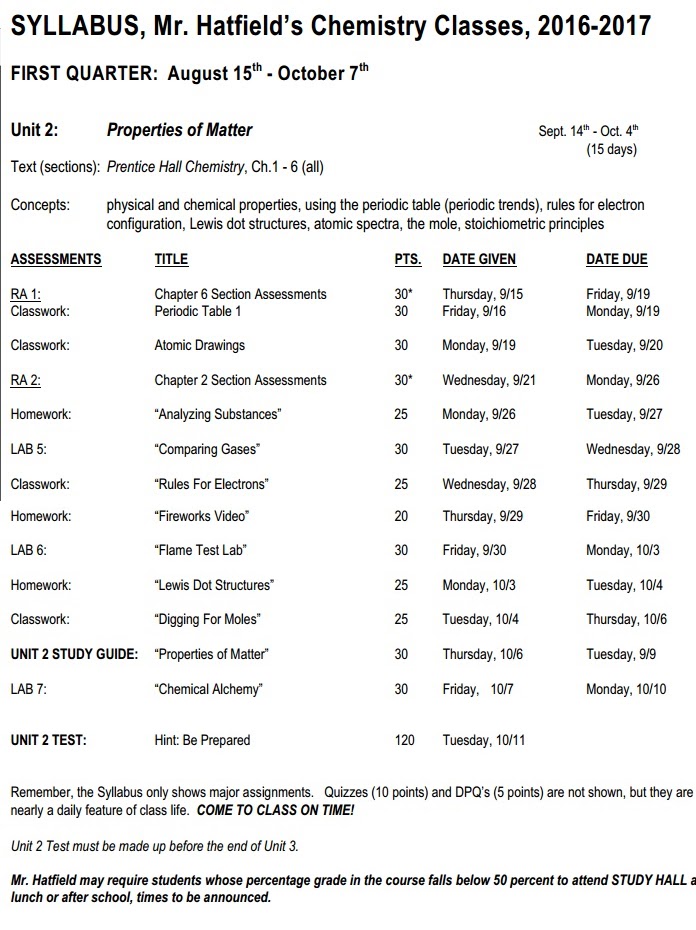Students who were in Mr. Hatfield's classes on Thursday, Sept. 29th, watched a PBS video entitled 'Fireworks!' Students who need to watch it again, or who were not present on Thursday, will find the video embedded below in this post.
The worksheet for this video can be obtained HERE.
Students should pay careful attention to items from Chapter 5 (electron configuration) and Chapter 7 (ionic compounds):
Thursday, September 29, 2016
Friday, September 23, 2016
SYLLABUS UNIT 2
Here is the syllabus for Unit 2, which began on the 14th. Students who struggled on their first test can raise their test scores by making better choices, as outlined in the earlier post about 'COPING' with Mr. Hatfield's tests.
The syllabus:
The syllabus:
Thursday, September 22, 2016
VIDEO: 'STANDARD DEVIANTS', THE BASICS OF CHEMISTRY
Parts of this video were shown in class on September 20th, a day that Mr. Hatfield was out of class and students had a substitute teacher.
The sections of the video shown in class dealt with measurement (metric system, significant figures) and stoichiometry. I'm making this available here so anyone who was absent that day can review it, or (if present) watch it again. These topics will crop up on a weekly basis for most of the year.
The sections of the video shown in class dealt with measurement (metric system, significant figures) and stoichiometry. I'm making this available here so anyone who was absent that day can review it, or (if present) watch it again. These topics will crop up on a weekly basis for most of the year.
Monday, September 12, 2016
YOUR FIRST TEST: WHAT TO EXPECT
So, many students will be disappointed and discouraged by their first exam. But know this: if you learn from the experience, you will improve, and you will even get opportunities to improve your original grade.
Students who earn a percentage score higher than that earned on the first test can not only expect to earn a higher grade, but they are eligible for grade change on their previous test.
To achieve that, students need to consider the following, using the anagram 'COPE'.
C....(ontent)
Students need to know what's on the test.
To make sure that students know what content will be covered on the exam, they need to obtain and complete a copy of the Study Guide, which becomes available the weekend before the test. At the same approximate time, Mr. Hatfield will make the notes and practice questions available on the class blog. The sooner the students develop the habit of comparing their Composition Book with these materials, the sooner they will improve!
O....(rganization)
Students need to plan their time.
Students should consider forming Study Groups with fellow students, perhaps after school on the day before the exam. They earn points by attending, and get valuable feedback about what is likely to be covered. Students need to consider using time on lunch or after-school on the day of their exam as needed to complete their test. Plan ahead, students!
P...(reparation)
Students need to provide evidence that they have prepared for the test.
One way to do this is to attend Study Hall during lunch, before the next test. Another, powerful way is to make sure that they bring their COMPOSITION BOOKS to class on the day of the exam. This should not only contain their completed notes, but their Lab Reports with examples of how to solve certain kinds of chemistry problems. Students who have these items completed will be allowed to use them throughout the exam. Bring evidence that you have prepared for the test, students, and you will be rewarded!
E...(ffort)
Students need to finish what they start.
There is nothing more important than giving our best effort, all of the time. On an exam day, a good effort means that students attempt everything, even if that means they need to come back at lunch or after school. Show a work ethic, students, and you will not only do better on the test....you will do better in every aspect of your life.
PARENTS, ENCOURAGE YOUR STUDENT TO USE THESE STRATEGIES TO EXCEL!
One way to improve O(rganization) and P(reparation) is to use the SYLLABUS for each Unit. With that in mind, here is the SYLLABUS (the schedule of major events) for Unit 2:
Friday, September 2, 2016
VIDEO: 'THE LIVES OF THE STARS'
;
The following episode of Carl Sagan's Cosmos, 'The Lives of the Stars', forms the basis of a student homework assignment given in class on Friday, September 2nd.
Students who were not in class on Friday can download this assignment as a PDF file, available HERE:https://www.mediafire.com/?71ktqmdm2k71ekk
There is also a worksheet on doing scientific notation, like the 'powers of ten' discussed in the video, available HERE:
The entire episode is available for students to watch HERE:
https://www.youtube.com/watch?v=RIv6_NDSjHk
The following episode of Carl Sagan's Cosmos, 'The Lives of the Stars', forms the basis of a student homework assignment given in class on Friday, September 2nd.
Students who were not in class on Friday can download this assignment as a PDF file, available HERE:https://www.mediafire.com/?71ktqmdm2k71ekk
There is also a worksheet on doing scientific notation, like the 'powers of ten' discussed in the video, available HERE:
The entire episode is available for students to watch HERE:
https://www.youtube.com/watch?v=RIv6_NDSjHk
Subscribe to:
Comments (Atom)



